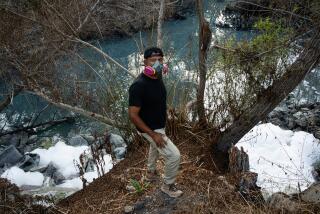U.S, Mexico Probe Toxic Dump Site in Tecate
TECATE, Mexico — Mexican and U.S. officials have launched inquiries focusing on how suspected toxic wastes from the United States were shipped across the border and dumped on an isolated ranch in this Mexican border town.
U.S. officials have voiced fear that the dumping could be part of a pattern in which toxic wastes from the United States are transported across the Mexican border to avoid increasingly stringent regulations and high disposal costs on the U.S. side.
“This may become part of the identification of a bigger problem,” said Jeffrey Zelikson, deputy director of the toxic and waste management division of the Environmental Protection Agency’s regional office in San Francisco.
Because of the Tecate incident, Zelikson said, the EPA has begun a review of the issue to determine whether any U.S. laws were broken.
15 Miles From Tecate
From late November until early January, Mexican officials say, a Tijuana-based firm dumped hazardous materials from the United States at a rural site known as El Encinal, about 15 miles east of downtown Tecate. A firm in National City, a San Diego suburb, helped arrange transport of the materials, which originated at various areas in the United States.
Dozens of residents who live near the dump site have complained of illnesses that they fear may be linked to the contamination.
While acknowledging that some of the waste material is toxic and poses a potential health hazard, Mexican officials stated that there is no evidence linking the dump to the recent illnesses. The 20 or so people examined showed symptoms probably caused by viruses or other factors, said Dr. Porfirio Garcia Gonzalez, chief of the Mexican Health Secretariat for the region that includes Tecate. Tests also indicate no contamination of area wells, Garcia said.
Shipments Blocked
Although Mexican officials have yet to specify the wastes discovered at the site, authorities have closed the dump and blocked additional shipments of wastes bound for here. Samples are being analyzed, officials said.
Mexican officials imposed a fine of about $24,000 against Guillermo Marin, identified as the principal owner of Tratamientos Petroquimicos Mexicanos S.A. (Mexican Petrochemical Treatments), the Tijuana firm that Mexican officials say is responsible for the dumping. Marin was also ordered to remove the material within 15 days, said Ramon Quezada, a spokesman for the Tecate mayor’s office. Marin could not be reached for comment.
Mexican authorities say investigators from Mexico City found no radiation at the site, quelling fears of another incident like the one in 1983 in the border city of Ciudad Juarez near El Paso. That incident left hundreds of residents exposed to potentially dangerous levels of radioactivity after a U.S.-manufactured cancer-treatment machine containing radioactive cobalt-60 was scrapped and disassembled.
Despite the official reassurances, the toxic dumping incident has caused a furor in this town, a municipality of about 60,000 best known for the huge brewery that produces Tecate brand beer.
“We cannot allow our community to be a dump for toxic materials from anyplace else,” Mayor Cesar Moreno said in an interview in his office. “We have enough to worry about just taking care of our own wastes.”
Began in November
U.S. authorities fear that Mexico--with its comparatively lax regulations, low costs and long, largely isolated border with the United States--may have become an attractive destination for wastes from the United States.
Mexican officials say the dumping began sometime in late November, when trucks originating in the United States began bringing the waste materials into Tecate. The shipments were steady, but the volume varied from day to day. The dumping continued until mid-January, when officials began receiving complaints that eventually led them to suspend shipments and close the dump, which is on private land.
The waste materials dumped at Tecate originated from various companies throughout the United States, according to Darrel Duisen, chief executive officer of U.S. Technology & Disposal Services Inc., a National City-based firm that was under contract to Tratamientos Petroquimicos to help arrange for the disposal. In a telephone interview, Duisen described his firm as a middleman in arranging the disposal of waste materials, and said his firm followed all U.S. and Mexican laws “to the letter.”
The source of all the controversy--the dump site here--is a quiet place these days, sporadically watched by a police guard. Although officially closed, there is no fence around much of the area.
Sludge, Oils, Tars
The one-acre site is situated in a sparsely populated area about 200 yards north of the main highway between Tecate and Mexicali. Scattered throughout the site are piles of waste sand, pools of sludge, oils, tars and other materials and more than 100 multicolored 55-gallon drums in various stages of rust and decay.
Some drums are empty, while others contain varying amounts of materials. Among the drums’ original contents, according to fading labels that are all written in English, were mineral spirits, assorted petroleum products and industrial solvents--including trichloroethylene (TCE), a solvent that the EPA has identified as a cancer-causing agent. Other drums and waste material are believed to be buried at the site.
While investigators in the United States and Mexico try to determine what happened here, the dump’s neighbors remain skeptical about official reassurances that there is no connection between the dump and a recent spate of illnesses in the area.
“They say the material in the dump could be making the babies sick,” said Anna Maria Zuniga, who lives about a quarter of a mile from the dump and said three young family members have been vomiting blood and exhibiting other symptoms of illness. “People here are afraid of what might happen.”
More to Read
Sign up for Essential California
The most important California stories and recommendations in your inbox every morning.
You may occasionally receive promotional content from the Los Angeles Times.










